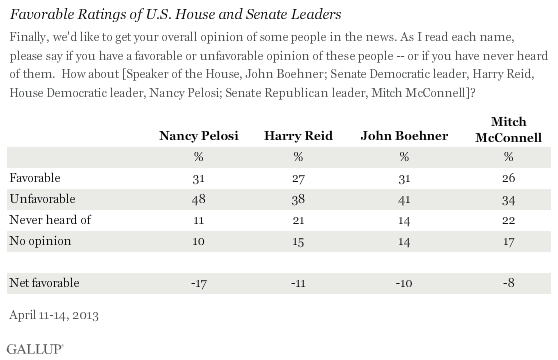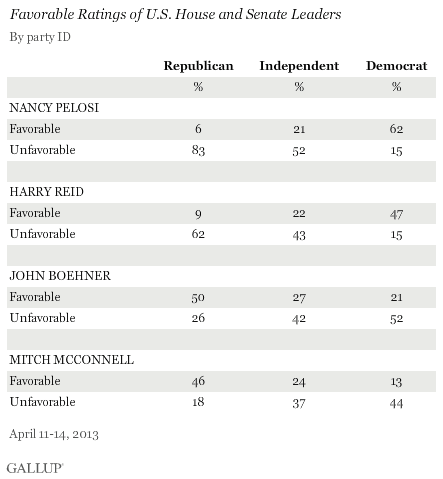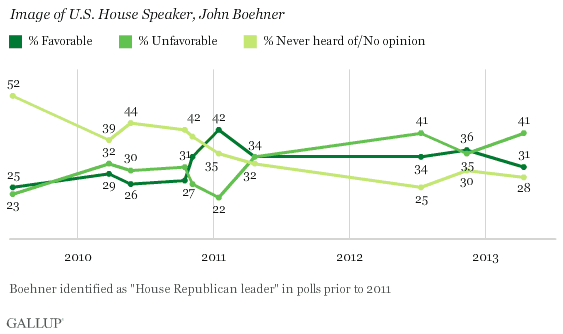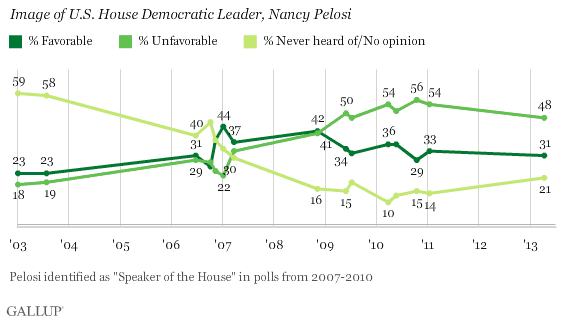PRINCETON, NJ -- The top Republican and Democratic leaders in the U.S. House and Senate are a generally unpopular foursome, with Democratic House Minority Leader Nancy Pelosi being the most well-known, but also the least well-liked. Thirty-one percent of Americans view Pelosi favorably and 48% unfavorably. Her resulting net -17 image score compares with -11 for Democratic Senate Majority Leader Harry Reid, -10 for Republican Speaker of the House John Boehner, and -8 for Republican Senate Minority Leader Mitch McConnell.

According to the April 11-14 Gallup poll, 79% of Americans have some impression of Pelosi -- favorable or unfavorable -- while 21% do not, either because they have no opinion about the California congresswoman and former House speaker, or because they have never heard of her. Overall recognition of Pelosi compares with 72% for Boehner, 65% for Reid, and 60% for McConnell.
Pelosi Also the Most Polarizing
Pelosi also rates as the most polarizing of the four congressional leaders, a distinction she also held the last time all four were rated, in May 2010. This is based on the finding that, compared with Boehner, Reid, and McConnell, she receives the highest favorable reviews from members of her own party as well as the highest unfavorable reviews from members of the opposing party.
More specifically, 62% of Democrats view Pelosi favorably, while 83% of Republicans view her unfavorably -- a 145-percentage-point spread. This compares with a 109-point spread for Reid, a 102-point spread for Boehner, and a 90-point spread for McConnell.

Boehner's Rating Down From November
Boehner's moderately negative image today contrasts with the more neutral image of him Gallup found right after the November 2012 elections. At that time, 36% of Americans viewed him favorably and 35% unfavorably. However, his image today is not materially different from last July.
Apart from one especially positive honeymoon reading on Boehner taken shortly after he assumed the speakership in January 2011, Boehner's ratings as House speaker, and before that as House Republican minority leader, have tended to be neutral at best.

In contrast to the recent worsening of Boehner's ratings, those of Reid, his Democratic counterpart in the Senate and usual adversary, are virtually unchanged. The 27% viewing Reid favorably today compares with 28% last fall. At the same time, the percentage viewing Reid unfavorably rose only slightly, and not significantly, to 38% from 36%. The full trends for Reid, as well as all four leaders reviewed here, are available at the end of this report.
Pelosi's Image in Negative Rut
Pelosi's current image extends a run of net-negative reviews of her that took hold in 2009, during her third year as House speaker. While her current unfavorable rating is down slightly from two years ago, her favorable rating is about the same, and more Americans offer no opinion.
Longer term, Pelosi's national profile rose significantly after the 2006 elections, when she became the first female House speaker. In January 2007, Gallup found 44% of Americans viewing her favorably and 22% unfavorably, while 34% couldn't offer an opinion. Negative perceptions of Pelosi rose to 50% in May 2009 as she was embroiled in a public dispute with the CIA over "waterboarding" of terrorist suspects and whether she had previously been briefed on this "enhanced interrogation" technique. Her unfavorable rating peaked at 56% in October 2010, right before the Democrats lost control of the House of Representatives in that year's midterm elections.

One positive note is that all four leaders' favorable ratings exceed Congress' overall job approval rating, now at a dismal 15%.
Bottom Line
Two years after Boehner replaced Pelosi as U.S. House speaker, Pelosi continues to be better known by Americans and maintains much of the high negatives she acquired during her stint in the job. Boehner isn't too far behind in either regard; however, given the incremental shifts seen to date in his ratings as speaker, it's unlikely that he will overtake her in recognition or unpopularity anytime soon.
Meanwhile, the other top leaders in Congress -- Reid and McConnell -- also garner higher negative than positive ratings, only with more Americans unable to rate either one.
The implication for the 2014 elections is that neither congressional caucus has a strong front man or woman to lead its party's midterm campaign. Given her popularity among fellow Democrats, Pelosi would appear to be the best messenger to help bring Democrats to the polls, but, if too visible, she might be even more effective at turning out Republicans, as may have been the case in 2010.
While Boehner, McConnell, and Reid are each viewed favorably by about half of their own party members, Boehner and McConnell provoke less ire from rank-and-file Democrats than Reid does from Republicans, making them somewhat safer, if tepid, spokesmen. The Democrats might find the job is better left to a surrogate like Hillary Clinton, with her stellar 64% favorable rating in the same poll, or, to a lesser degree, Barack Obama, with his 55%.
Survey Methods
Results for this Gallup poll are based on telephone interviews conducted April 11-14, 2013, with a random sample of 1,012 adults, aged 18 and older, living in all 50 U.S. states and the District of Columbia.
For results based on the total sample of national adults, one can say with 95% confidence that the maximum margin of sampling error is ±4 percentage points.
Interviews are conducted with respondents on landline telephones and cellular phones, with interviews conducted in Spanish for respondents who are primarily Spanish-speaking. Each sample of national adults includes a minimum quota of 50% cellphone respondents and 50% landline respondents, with additional minimum quotas by region. Landline telephone numbers are chosen at random among listed telephone numbers. Cellphone numbers are selected using random digit dial methods. Landline respondents are chosen at random within each household on the basis of which member had the most recent birthday.
Samples are weighted to correct for unequal selection probability, nonresponse, and double coverage of landline and cell users in the two sampling frames. They are also weighted to match the national demographics of gender, age, race, Hispanic ethnicity, education, region, population density, and phone status (cellphone only/landline only/both, cellphone mostly, and having an unlisted landline number). Demographic weighting targets are based on the March 2012 Current Population Survey figures for the aged 18 and older U.S. population. Phone status targets are based on the July-December 2011 National Health Interview Survey. Population density targets are based on the 2010 census. All reported margins of sampling error include the computed design effects for weighting.
In addition to sampling error, question wording and practical difficulties in conducting surveys can introduce error or bias into the findings of public opinion polls.
View methodology, full question results, and trend data.
For more details on Gallup's polling methodology, visit www.gallup.com.
